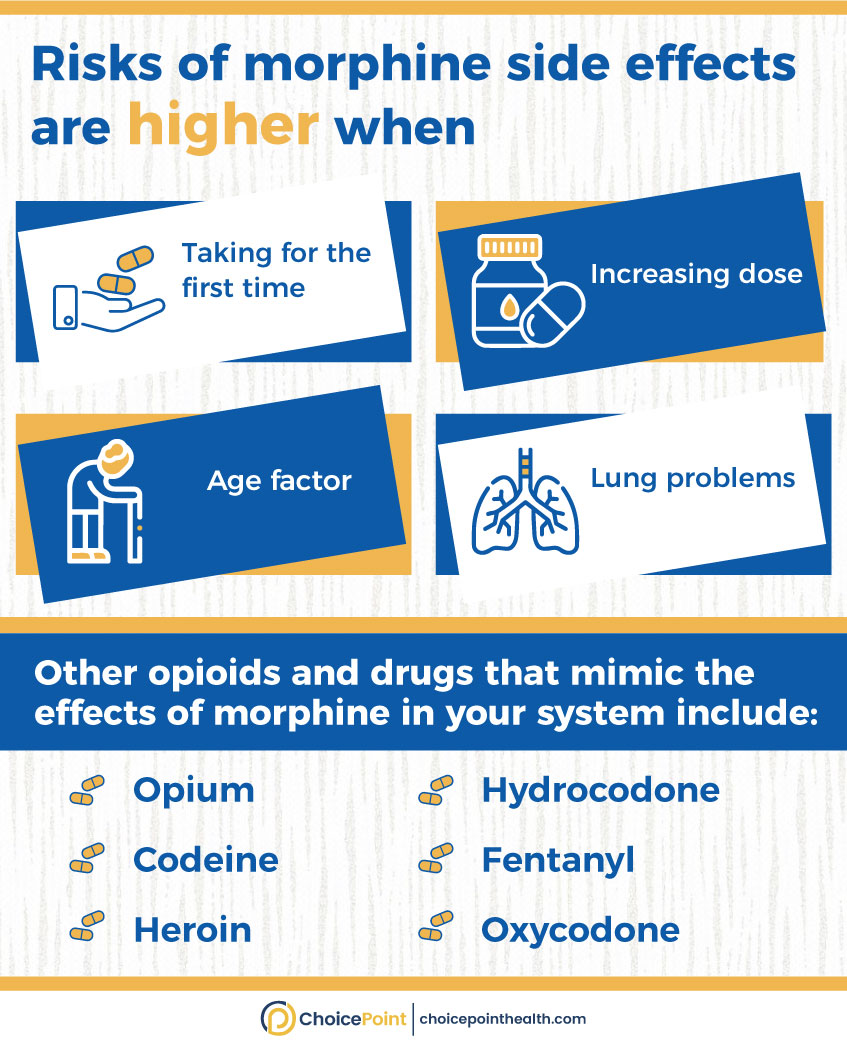According to the Centers for Disease Control and Prevention, more than 50 Americans fatally overdose on opioids, including morphine, every day. The longer Morphine stays in your system, the more fatal it gets; eventually, its overdose can lead to death. Timely treatment can avoid the risks of unfortunate circumstances.
ChoicePoint’s Opioid addiction treatment program is best suited for people struggling to remove morphine and other opioids from their system forever. Call Now 844.445.2563 to learn more about how long does morphine stay in your system!
Table of Contents
What Is Morphine?
Morphine (Morphine Sulfate), named after the Greek God of Dreams, Morpheus, is a natural opioid analgesic (painkiller) that is derived from opium (poppy plant). It comes under Schedule II Narcotic in the Controlled Substance Act. It is taken as a tablet, syrup, or injection and sometimes smoked or snorted. Medically, it is used for moderate to severe pain for ailments like:
- Cancer
- Accidents (broken bones, muscular tears, etc.)
- Severe body pains after surgery
- Pain followed by heart attack
- Severe cases of migraines
Medically, morphine is available under the following brand names:
- Roxanol
- Oramorph SR
- Morphabond
- MS Contin

How Deadly Morphine Addiction Can Be!
How Long Does Morphine Stay in Your System
Morphine taken through injection is readily available to the brain within 20 minutes, while it usually takes 30-90 minutes to reach the blood when taken orally as a tablet.
Morphine in your system will have different timelines:
- Salival morphine stays for up to four days
- Blood can be tested for morphine for up to three days
- Morphine in breastmilk stays for up to three hours
- Urine can show signs of morphine last for up to three days
- Morphine in hair stays for up to ninety days
- Morphine in sweat stays for up to 14 days
Factors Affecting How Long Morphine Stays in Your System
Some of the factors that affect how long does morphine stay in your system are:
- Age: Older people have a slower morphine clearance rate than young ones.
- Genetics: People with weak immune systems and metabolism due to genetics might have a poor morphine clearance rate
- Body Mass Index: Weight, Height, and Body fat influence a person’s morphine clearance rate indirectly.
- Morphine metabolism by the Liver and Kidney directly influences morphine clearance from the body.
- Frequency of Morphine Use: individuals with morphine use disorder are less likely to get rid of morphine from their system anytime soon.
- Morphine Tolerance: frequent users of opioids or other drugs build up a tolerance to morphine and use it excessively, leading to poor morphine clearance from the body.
Morphine Half-life
The half-life of morphine is defined as the time a body takes to eliminate half of the drug from the system. Morphine has an average half-life of 1-7 hours approximately, depending on a body’s metabolism. A body usually takes 4-5 half-lives to eliminate the drug. So, in the case of morphine, a person’s body can take 4 to 35 hours for morphine clearance from their system.
Some of the factors that influence half-life can be:
- Age
- Frequency of morphine use
- Medical conditions
- Body metabolism
- Ways of administration
Fearing about how long does morphine stay in your system? Call Now 844.445.2563 to learn more and start your morphine addiction treatment at ChoicePoint.
How to Detect Morphine in Your System Through a Drug Test
Morphine drug tests are usually performed at addiction treatment centers for treatment or for legal purposes to check the level of morphine in the body. They can be detected according to the above timeline given.
- A swab stick detects morphine in saliva, which changes color depending on the morphine levels.
- Morphine in the blood is detected by taking a small sample, typically 5ml, for performing a chromatography test to check drug level.
- A urine sample is applied on a chromatograph to detect morphine in urine, but sometimes urine samples give false detection due to interference with other medications.
- A hair follicle test is performed by excising at least 1.5 inches of hair and sending it to the laboratory for morphine detection.
Are you looking for Morphine Drug Testing? Our 24/7 telehealth service provides a home drug testing facility! We are virtually available statewide in Montana, New Jersey, and South Jersey. Call Now 844.445.2563 to get your testing kits mailed to your home!

What You Need to Know About Morphine Side Effects?
What Are the Effects of Morphine Staying in Your System?
According to the half-life of morphine, this drug should wear off its effects in 2-8 hours, but how long does morphine stay in your system depends upon the dose administered and the way it has been injected!
- Morphine taken intravenously is readily available to the body but has the shortest half-life.
- Morphine taken with other substances, such as heroin and alcohol, increases its effective time on an individual’s body.
Effects of Morphine on Your Body
People sometimes use morphine for recreational purposes and feelings of well-being, leading to addiction and overdose. Some of its effects include:
- Inhibits cough-inducing reflexes
- Reliefs chronic pain
- Slows bodily functions, causing a feeling of “high.”
- Lowers brain functioning, inducing stress relief
- Euphoria
Side Effects of Morphine Use
A person should seek immediate medical assistance whenever they observe the following side effects of morphine in a recurring manner.
- Nausea
- Numbness
- Coma
- Disrupted breathing pattern
- Sleepiness
- Fainting
- Mood swings
- Itching and body rash
There are common morphine addiction facts people usually ignore. Morphine, if not taken under strict medical supervision, can even cause death. You need to get help today!
How long Does the Morphine Withdrawal last?
Morphine withdrawal symptoms usually start after a person has stopped using morphine:
- The onset of withdrawal symptoms usually begins between 8 to 12 hours of the initial quit
- Short-term withdrawal symptoms last for 4-5 hours
- Peak effects of morphine withdrawal symptoms usually come between 36-72 hours of the initial quit
- Withdrawal symptoms typically fade away after 7-10 days
Morphine specifically acts on the Central Nervous System and relieves pain by blocking pain receptors and decreasing neural activity. Some of the risky withdrawal symptoms that are experienced during morphine addiction treatment are
- Digestion issues
- Anxiety, nervousness, and depression
- Low blood pressure
- Breathing issues
- Slow heart rate
- Dehydration and sweating
- Body pains
- Flu-like symptoms
Manage your morphine withdrawal symptoms under the supervision of DAE-certified practitioners. Call Now 844.445.2563 to book your appointment at ChoicePoint!
Start Morphine Addiction Treatment with ChoicePoint
ChoicePoint is a panoramic addiction treatment center that offers your morphine detox and withdrawal symptoms management through their addiction treatment and addiction therapy plans such that:
MAT-Buprenorphine
We offer several detox programs, including FDA-Approved Medication-assisted treatment for Morphine through Buprenorphine. This program includes detox and medical withdrawal symptom management of morphine through:
- Intensive Outpatient MAT
- Outpatient MAT
- Telehealth MAT
How long does buprenorphine stay in your system? It can also be effective for morphine addiction treatment information.
To manage Psychosocial symptoms and relapse prevention strategies, we offer morphine addiction therapies for personalized as well as general treatment, including
- Dual diagnosis for co-occurring disorders related to morphine
- Cognitive behavior therapy
- Dialectical behavior therapy
- Individual therapy/ Group therapy
- Family therapy
Call Now 844.445.2563 for our 24/7 DEA-certified practitioners. Please verify your insurance; we have that covered too!
Medical Disclaimer:
ChoicePoint aims to improve the quality of life for people struggling with substance use disorder and mental health issues. Our team of licensed medical professionals research, edit and review the content before publishing. However, this information is not intended to be a substitute for professional medical advice, diagnosis, or treatment. For medical advice please consult your physicians or ChoicePoint's qualified staff.











Review How Long Does Morphine Stay in Your System?.